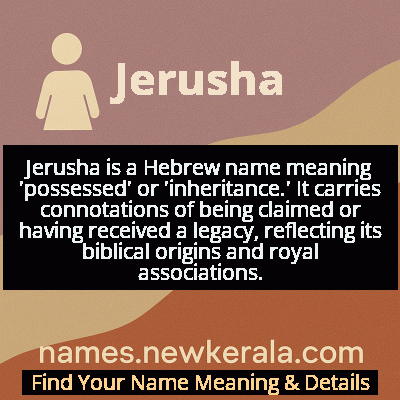Jerusha Name Meaning & Details
Origin, Popularity, Numerology Analysis & Name Meaning of Jerusha
Discover the origin, meaning, and cultural significance of the name JERUSHA. Delve into its historical roots and explore the lasting impact it has had on communities and traditions.
Name
Jerusha
Gender
Female
Origin
Hebrew
Lucky Number
1
Meaning of the Name - Jerusha
Jerusha is a Hebrew name meaning 'possessed' or 'inheritance.' It carries connotations of being claimed or having received a legacy, reflecting its biblical origins and royal associations.
Jerusha - Complete Numerology Analysis
Your Numerology Number
Based on Pythagorean Numerology System
Ruling Planet
Sun
Positive Nature
Leaders, ambitious, highly driven, self-reliant, innovative.
Negative Traits
Overly aggressive, domineering, impatient, selfish.
Lucky Colours
Red, orange, gold.
Lucky Days
Sunday.
Lucky Stones
Ruby, garnet.
Harmony Numbers
2, 3, 9.
Best Suited Professions
Entrepreneurs, managers, engineers.
What People Like About You
Courage, determination, leadership.
Famous People Named Jerusha
Jerusha Hess
Film director and screenwriter
Co-writer and co-director of 'Napoleon Dynamite' and director of 'Austenland'
Jerusha B. J. G. Hatch
Missionary and educator
Early American missionary to Hawaii who established schools and translated educational materials
Jerusha Abbot
Literary character
Protagonist of Jean Webster's novel 'Daddy-Long-Legs', an orphan who becomes an educated writer
Name Variations & International Equivalents
Click on blue names to explore their detailed meanings. Gray names with will be available soon.
Cultural & Historical Significance
Throughout Christian history, Jerusha maintained occasional usage, particularly among Puritan communities in the 17th and 18th centuries who favored Old Testament names as expressions of their faith. The name experienced a cultural resurgence in the early 20th century with the publication of Jean Webster's novel 'Daddy-Long-Legs' (1912), whose protagonist Jerusha Abbott became an iconic literary figure representing education, independence, and female empowerment. This literary connection introduced the name to broader audiences and cemented its association with intelligence, creativity, and personal growth. The name continues to be used selectively in religious communities and by those seeking distinctive biblical names with rich historical resonance.
Extended Personality Analysis
Individuals named Jerusha typically exhibit a blend of traditional values and independent thinking, reflecting the name's biblical heritage and literary associations. They often possess a quiet confidence and intellectual depth, with strong analytical abilities and a methodical approach to problem-solving. Jerushas tend to be observant and perceptive, noticing details that others might overlook, and they value meaningful conversations over superficial small talk. Their reserved nature often conceals a rich inner world of creativity and imagination, making them excellent writers, artists, or researchers.
In social settings, Jerushas are known for their loyalty and reliability, forming deep, lasting friendships rather than numerous casual acquaintances. They demonstrate strong moral convictions and a sense of responsibility toward their communities, often taking on leadership roles that allow them to make meaningful contributions. While they may appear conventional on the surface, many Jerushas harbor unconventional ideas and innovative approaches to traditional problems. Their combination of historical awareness and forward-thinking perspectives makes them effective bridge-builders between past and future, capable of honoring traditions while embracing progress. The name's royal associations sometimes manifest in natural leadership qualities and a dignified presence that commands respect without seeking attention.
Modern Usage & Popularity
In contemporary naming practices, Jerusha remains a rare but meaningful choice, typically selected by parents who value biblical heritage, literary connections, and distinctive names. The name has never achieved mainstream popularity, consistently ranking outside the top 1000 names in the United States and most English-speaking countries. Its usage is most common in religious communities, particularly among evangelical Christians and those with strong Hebrew heritage, where Old Testament names maintain cultural significance. The literary association with 'Daddy-Long-Legs' continues to influence modern usage, appealing to parents who appreciate the character's journey from orphan to educated, independent woman. While the name faces competition from more popular biblical names like Sarah, Rachel, and Rebecca, its rarity is often seen as an advantage by parents seeking unique names with substantial historical and cultural weight. Recent trends show slight increases in usage among parents interested in vintage names and those looking for strong feminine names that are both traditional and uncommon.
Symbolic & Spiritual Meanings
Symbolically, Jerusha represents the concept of inheritance in its broadest sense—not merely material possessions but spiritual legacy, cultural traditions, and personal destiny. The name embodies the idea of being 'claimed' or 'chosen,' reflecting both divine election and personal purpose. Its royal biblical associations add layers of symbolism related to leadership, responsibility, and the continuity of values across generations. Metaphorically, Jerusha can represent the bridge between ancient wisdom and contemporary application, suggesting someone who honors tradition while adapting it to modern contexts.
The name also carries symbolic weight related to possession and stewardship, indicating someone who cares for and develops what has been entrusted to them. This extends to relationships, knowledge, and cultural heritage. In a psychological sense, Jerusha symbolizes the integration of past experiences with future aspirations, representing personal growth that respects roots while reaching for new possibilities. The literary connection through 'Daddy-Long-Legs' adds symbolic dimensions of education, transformation, and the power of writing to create identity and connection. Overall, Jerusha serves as a symbolic reminder that our greatest inheritances are often intangible—wisdom, character, and the stories that shape who we become.

